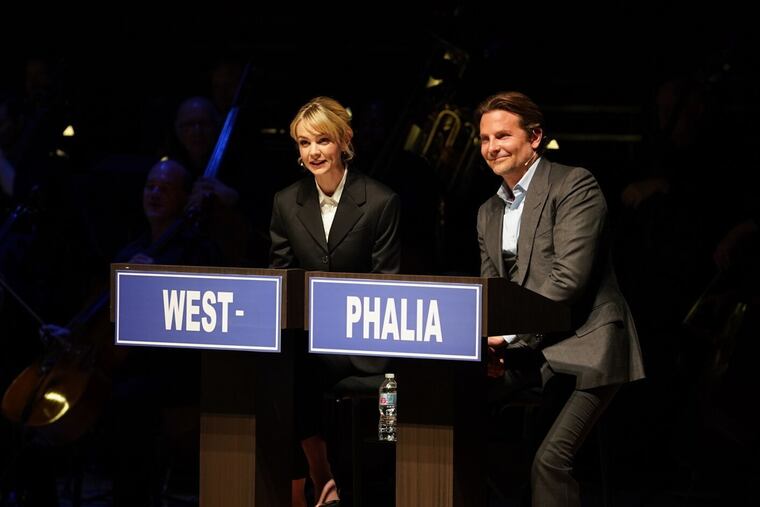Bradley Cooper’s debut with the Philadelphia Orchestra is just the right amount of star power
The Hollywood star out of Rydal was a polite guest of the Philadelphia Orchestra in a production of Leonard Bernstein’s “Candide” that pulled out all the stops. And then some.

The Philadelphia Orchestra is concluding its Kimmel Center season with an event that, in its Thursday night opening, resembled a sports game victory, a Broadway show, and an all-round love fest.
Leonard Bernstein’s Broadway operetta Candide is a great audience event as well as a significant vocal showcase, and young cast members Erin Morley and Alek Shrader put lasting stamps on their widely sung lead roles. Old friends to Philly opera fans Denyce Graves and William Burden were better (and more adored) than ever.
And the starry co-narrators? Bradley Cooper and Carey Mulligan stayed out of the way, knowing that their function was to frame the show, not steal focus from it — Mulligan with her crisp British accent and Cooper sounding a bit Midwestern, with a manner that let punchlines take care of themselves while still making their point.
The Hollywood star out of Rydal is prepping to play Bernstein in an upcoming biopic, and he proved himself a polite guest to the Philadelphia Orchestra and attentive student of the material. His entrance applause was par for the course for a visiting artist, and he was restrained and respectful of the occasion.
Tucked away at the far end of the stage — at side-by-side lecterns labeled “West-” and “Phalia” as if they were at a high school debate — Cooper and Mulligan set their celebrity wattage low enough to let the singers and the musicians carry the night.
Cooper was, however, given the final line of the show, which usually goes to one of the characters — “Any questions?” — an improvement that briefly allowed the audience to pull back and consider what lessons are offered in this comically philosophical show.
It can be hard to focus with a motley crew of characters being buffeted around the globe by wars, volcanoes, and sinking ships among Germany, South America, and other locales.
Whose ‘Candide’ is it?
Anyone who loves Candide has to walk in with open-ended expectations. The show was revised, expanded, contracted, and expanded so repeatedly between its 1956 Broadway opening and Bernstein’s 1990 death that you can never be sure what music will be used.
This version is what’s called the “New York Philharmonic/Lonny Price” version, and leaves out too much great stuff (like the ballad “Nothing More Than This”) in a score that superficially resembles a 19th-century Offenbach operetta, but breezily carries your ear from one far-flung locale to the next.
The freewheeling farcical manner of performance that has developed in Candide over the years means that production aspects are likely to be an extremely wild card, as the characters die repeatedly, springing back to make the same mistakes, a la Groundhog Day.
Many production concepts are possible, and this semi-staged one by Kevin Newbury put the show in a 1990s high school. It worked in the early scenes, but later on, the stage seemed needlessly littered with marginally relevant people wearing mundane gym clothes.
And was there any charm at all? Not when the story asks for a war and gets a high school sports tournament. Or when the libretto’s slave auction became a cheerleader tryout. It all felt so false.
A few good touches on Thursday included a sex education video that flashed the AIDS-era “Silence Equals Death” logo (which is I how I remember the ‘90s) and the pot-smoking denizens of the utopian Eldorado offering music director Yannick Nézet-Séguin a toke. (He just said no.)
Bernstein as voice of truth
While Bernstein’s score once buoyed the pedestrian Lillian Hellman libretto in the 1956 Broadway original, the music played a reverse role here, becoming the voice of truth amid so many theatrical gags.
Nézet-Séguin never let you forget that this is at heart a love story, giving those moments broad tempos and a particularly rich, warm sound from the orchestra. The Philadelphia Symphonic Choir sounded quite opera savvy.
While he seemed to enjoy the production, Nézet-Séguin never let vocal precision slip among the singers in what was easily among the best Candide casts that I’ve heard.
A tasteful sound design had the singers wearing forehead microphones, which meant they didn’t have to sing out so much, and could articulate the lyrics with precision and still vocally function while doing so much stage shtick.
To Newbury’s credit, the singers gave vivid, well-formed characterizations — handling the spoken dialogue adeptly and avoiding potentially dated stereotypes.
Pangloss as biker
In one of the more original strokes: Dr. Pangloss, the erudite teacher, was a swaggering, motorcycle-riding iconoclast with a message of radical optimism (conceptually similar to Hellman’s version of the character) and was beautifully sung by Kevin Vortmann.
As Cunegonde, soprano Morley was the perfect spoiled rich girl and interpolated her own ornaments into “Glitter and Be Gay” with spectacular effect.
Every Candide becomes tiresomely ingenuous after a while, but Shrader wore well over the show’s duration, aided by his rich baritone.
Costumed in sports coach attire, Burden (as the South American governor) was barely recognizable — though when his voice climbed up to those high notes in “My Love” it was undoubtedly him.
As the aging courtesan (the Old Lady), Graves appeared under a mountain of hair and gave the kind of recklessly extroverted performance that probably wasn’t possible 20 years ago, before she disappeared from her major opera career but came back in triumph last fall in the Metropolitan Opera cast of Marnie (playing the title character’s mother).
But while your ears could be swept away by performances like hers, you just as frequently winced at what you had to look at.
Repeat performances of Candide are 8 p.m. Friday and Saturday at the Kimmel Center. Tickets: $45-$195. Information: 215-893-1999 or www.philorch.org.